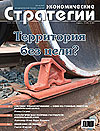Territory Without Aims?
Opening address of editor-in-chief.

Opening address of editor-in-chief.
In interview Roald Sagdeev — Chief Researcher at the SRI, professor at the University of Maryland, NASA expert, using the unique experience of living and working in very different countries — the Soviet Union, America and Russia, compares their academic systems and creates the image of ideal science.
The article is dedicated to the reforms of the outstanding Russian statesman Pyotr Stolypin. It reflects realized and missed opportunities to reform the complex socio- economic system of the Russian empire, its economy, social structure , the Army, the Navy, the institutional sphere in general. The article the necessity and the possibility of applying some of the reform approaches and methods of the early 20st century in Russia to the modern practice of reforming and developing the domestic economy.
The paper discusses theoretical and legal aspects of the national security of the Russian Federation. The author analyzes the “national security” definitions offered by different researchers and provides his own definition. Considering the national security issue the author draws attention to associated problem blocks, indicates the activities that may be conducted for this purpose. The author analyzes basic documents adopted in Russia, which form the legal basis of the national security system of our country, traces the relationship between national security and international security.
The article suggests the definition and describes the common traits of political crisis in the context of globalization. It is considered, that phenomena mentioned above are bind with the new global tendencies that shape the future political management principles. Among them — the high rate of human self-organization and the Internet, that became the public space of the 21st century, the world’s town square, that gave rise to public rebels against the political regimes in post-soviet republics and during the “Arab spring” in 2011.
The possibility of joint implementation of real options theory and game theory as applied to the subjects of the national economy modernizes the system of strategic management. Scenario analysis of competitive enterprises in framework of the market structure of “oligopoly” is presented. The mathematical apparatus of game theory allowing to use competitive enterprise management component as a strategic driver is explained. An example is given illustrating the possibility of exercising rights to specific activities in order to increase the capitalization of company, and the expansion of competitive advantage by optimizing strategic policy.
Creation and management of an integral functional architecture — a prerequisite of a sustainable system of state governance, its controlled development and logic. Transformation of cross-border processes, transition from the current state to the advanced forms of governance are required.
Each object of Being, including thinking, determines links that it creates to other objects and at the same time is determined by them. From their number and nature depends, in particular, the possibility of the object development (structuring), including the discovery, having the character of bifurcations.
The article examines the organizational weapon as a new type of strategic weapons and provides a retrospective review of its use in the last 65 years. The author draws a conclusion that the possibilities of eliminating pathological system as a leading factor of organizational weapons reside in psycho-social and cultural spheres of society. It means that external, formal ways of countering organizational arms are not suitable at all.
The article discusses particular features of the geopolitical and geoeconomic situation of the Central Asian countries and Afghanistan. Comparisons of their integrated strength are made applying the strategic matrix model.